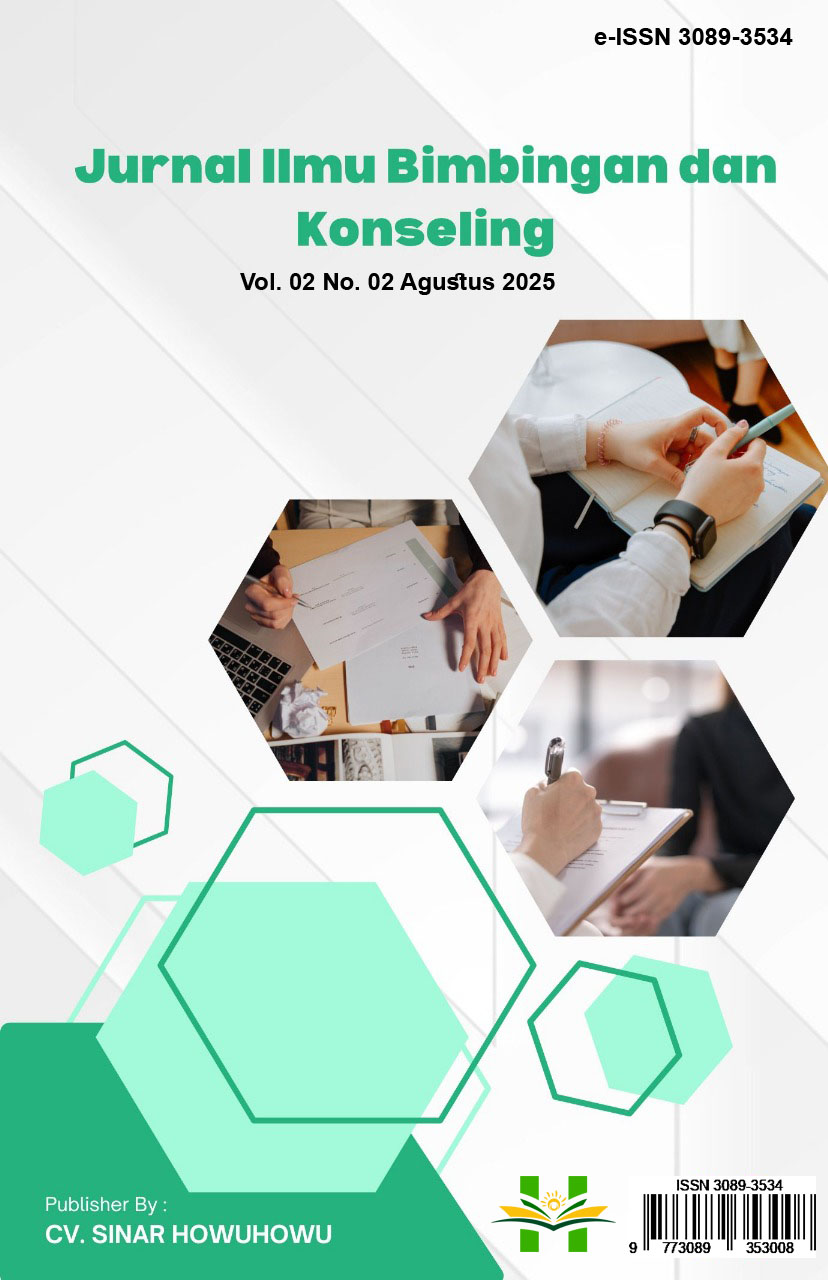Profil Psikuedukasi Self-Efficacy Dalam Perencanaan Karir Siswa Dan Implikasinya Terhadap Nilai Filsafat Pendidikan
DOI:
https://doi.org/10.70134/bikoling.v2i2.727Keywords:
Psychoeducation, Career planning, SMK, Self-efficacy, Philosophy of educationAbstract
Based on the reality in the field, some students have difficulty making career plans that are in line with their stage of professional growth. This is the background of this research. Psychoeducation is the practice of providing psychological knowledge or education to individuals or groups to increase their self-efficacy in career planning. Adolescent career planning involves selecting the type of additional education they are interested in because it is considered a component of their career development. Furthermore, many vocational high school graduates still have difficulty choosing jobs and developing in their fields of specialization. Because their skills do not match the needs of business, industry, or entrepreneurship, vocational high school graduates continue to face challenges in finding meaningful work and starting their own businesses. And what are the implications for the philosophy of education? This study uses a quantitative descriptive research design. The tools used are a survey of self-efficacy and career planning for vocational high school students. Based on the research findings, the students' overall self-efficacy profile is in the high category, while their career planning profile is in the competent group. In addition, self-efficacy has an important role in students' career planning. Guidance and counseling teachers are advised to develop a unique self-efficacy psychoeducational program to enhance students' career planning skills by considering the elements included in this program that are in line with the educational philosophy.
Downloads
References
Anggito, A., & Setiawan, J. (2018). Metodologi Penelitian Kualitatif (Cet.1). Jejak.
Arikunto, S. (2006). PROSEDUR PENELITIAN SUATU PENDEKATAN PRAKTIK (4th, Rev ed.). Rineka Cipta.
Atmaja, T. T. (2014). Upaya Meningkatkan Perencanaan Karir Siswa Melalui Bimbingan Karir dengan Penggunaan Media Modul. PSIKOPEDAGOGIA Jurnal Bimbingan Dan Konseling, 3(2), 57. https://doi.org/10.12928/psikopedagogia.v3i2.4466
Azwar, S. (2004). Reliabilitas dan Validitas (3rd, Cet.5 ed.). Pustaka Pelajar.
Bella, K., SRRetnaningdyastuti, T., & Rohastono Ajie, G. (2022). Hubungan Self-Efficacy Dengan Pengambilan Keputusan Karier Siswa Kelas Xi Sma Institut Indonesia. Jurnal Bimbingan Dan Konseling, 6(2), 229–239.
Bondarouk, T., & Ruël, H. (2013). The strategic value of e-HRM: Results from an exploratory study in a governmental organization. International Journal of Human Resource Management, 24(2), 391–414. https://doi.org/https://doi.org/10.1080/09585192.2012.675
Utami, D. P., Melliani, D., Niman Maolana, F., Marliyanti, F., & Hidayat, A. (2021). Iklim Organisasi Kelurahan dalam Perspektif Ekologi. Jurnal Inovasi Penelitian, 1(12), 2735–2742. https://doi.org/10.47492/JIP.V1I12.536
Fatimah, S. (2018). Siti Pendampingan Perencanaan Karir dalam Meningkatkan Self Efficacy Siswa SMK. Psikodidaktika: Jurnal Ilmu Pendidikan, Psikologi, Bimbingan Dan Konseling, 3(1), 1–11. https://doi.org/10.32663/PSIKODIDAKTIKA.V3I1.300
Feist, J., & Feist, G. J. (2011). Teori Kepribadian = Theories of Personality (Tej.Handriatno) (7th, Cet.2 ed.). Salemba Humanika.
Hakim, L. (2017). Perspektif filsafat pendidikan terhadap psikologi pendidikan humanistik. Jurnal Sains Psikologi, 31–36.
Hardani, Auliya, N. H., Andriani, H., Fardani, R. A., Ustiawaty, J., Utami, E. F., Sukmana, D. J., & Istiqomah, R. R. (2020). Metode Penelitian Kualitatif & Kuantitatif. Pustaka Ilmu.
Hidayat, D. R., & Prabowo, A. S. (2019). A Career Development Program for Higher Education in Indonesia; The Strategy to Achieve Career Maturity. Proceedings of the 1st International Conference on Advanced Multidisciplinary Research (ICAMR 2018). https://doi.org/10.2991/icamr-18.2019.32
Irmayanti, R. (2019). Perencanaan Karier Pada Peserta Didik SMP. QUANTA: Jurnal Kajian Bimbingan Dan Konseling Dalam Pendidikan, 3(1), 1–6. https://doi.org/10.22460/q.v3i1p6-11.1356
Iskandar, A., Johanis, A. R. M., Mansyur, Fitriani, R., Ida, N., & Sitompul, P. H. S. (2023). Dasar Metode Penelitian (Cet.1). Yayasan Cendekiawan Inovasi Digital Indonesia.
Pujawardani, H. H., Hasan, M., & Saefurridjal, A. (2023). Implikasi Paradigma Aliran-Aliran Filsafat Terhadap Manajemen Sumber Daya Manusia Di Sekolah. Komitmen: Jurnal Ilmiah Manajemen, 4(1), 209–224. https://doi.org/10.15575/jim.v4i1.23810
Rahayu, P. P. (2022). Perencanaan Karir Di Masa Pandemi Covid-19 Bagi Siswa Kelas XII SMA Negeri 5 Semarang. Community Development Journal : Jurnal Pengabdian Masyarakat, 3(1). https://doi.org/10.31004/cdj.v3i1.3478
Ramadani, D. N., & Muhid, A. (2022). Efektivitas pelatihan perencanaan karier untuk meningkatkan career decision self-efficacy pada fresh graduate: literature review. Jurnal Psikologi Tabularasa, 17(1), 56–63. https://doi.org/10.26905/jpt.v17i1.8107
Ramahwati, N. T., Sri Ramadhani, H., & Ayunda Restu, I. (2023). Identifying Career Selection Of High School Students Based On John Holland’s Theory. Jurnal Ilmiah Konseling Pendidikan, 2(2), 39–44. https://doi.org/10.22437/kopendik.v2i2.28967
Riduwan. (2013). Skala Pengukuran Variabel-Variabel Penelitian. Alfabeta.
Santrock, J. W. (2007). Remaja (Tej. Benedictine Widyasinta) (11th, Jilid 1 ed.). Erlangga.
Saputro, K. Z. (2018). Memahami Ciri dan Tugas Perkembangan Masa Remaja. Aplikasia: Jurnal Aplikasi Ilmu-Ilmu Agama, 17(1), 25–32. https://doi.org/10.14421/aplikasia.v17i1.1362
Sharf, R. S. (1992). Applying Career Development Theory to Counseling (3rd ed.). Brooks/Cole Publishing Company.
Sugiyono. (2017). Metode Penelitian Kuantitatif, Kualitatif, R dan D (Cet.26). Alfabeta.
Suherman, U. (2013). Bimbingan dan Konseling Karier; Sepanjang Rentang Kehidupan. Rizqi Press.
Sumintono, B., & Widhiarso, W. (2014). Aplikasi Model Rasch untuk Penelitian Ilmu-Ilmu Sosial (Rev). Trim Komunikata Publishing House .
Walsh, J. (2010). Psychoeducation in Mental Health. Oxford University Press.
Zahra, F. El, & Yudiarso, A. (2024). Studi Meta-Analisis: Efektifitas Psikoedukasi untuk Meningkatkan Self-Efficacy. JIIP - Jurnal Ilmiah Ilmu Pendidikan, 7(12), 13336–13340. https://doi.org/10.54371/jiip.v7i12.6327
Downloads
Published
Issue
Section
License
Copyright (c) 2025 Yunita Dwi Aryani, Akhmad Fajar Prasetya, Dody Hartanto, Agus Ria Kumara (Author)

This work is licensed under a Creative Commons Attribution-ShareAlike 4.0 International License.













